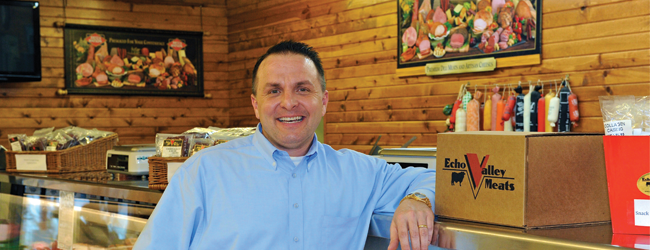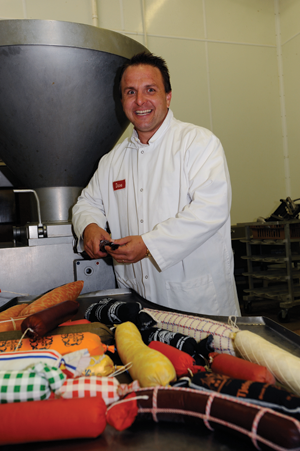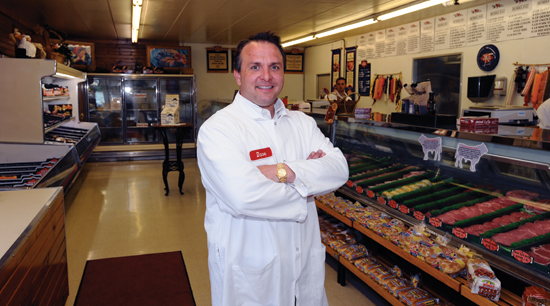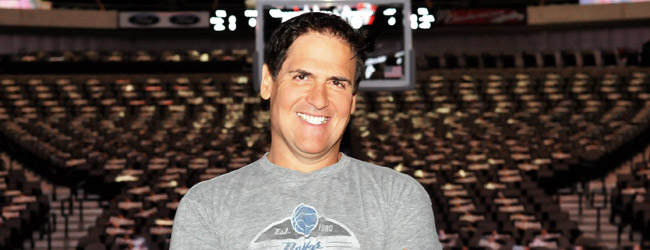
 Dave Alwan’s grandfather opened a grocery store in Peoria, IL in 1947. Like so many families who own a small business, Dave grew up in the family business. As a teen-ager Dave learned the business behind the counter by wearing a white butcher’s coat and cutting up stew meat by hand. And, there is no glamour in being a butcher, even when you are a member of the family who runs the business.
Dave Alwan’s grandfather opened a grocery store in Peoria, IL in 1947. Like so many families who own a small business, Dave grew up in the family business. As a teen-ager Dave learned the business behind the counter by wearing a white butcher’s coat and cutting up stew meat by hand. And, there is no glamour in being a butcher, even when you are a member of the family who runs the business.
In 1998 Dave decided to leave the family business, and with the support of his wife Dawn, ventured out on his own to form Echo Valley Meats. Dave started out by processing deer, and making deer Summer Sausage, deer jerkey and “slim jims” for local hunters.
From those simple beginnings, Dave has grown Echo Valley Meats into a full-service specialty meat store in the Peoria area and recently was chosen to appear on the national TV show, the Shark Tank, where Dave had the opportunity to showcase his business to the likes of which included Mark Cuban, billionaire owner of the Dallas Mavericks.
How long have you and your family been in the meat business?
Our family started in 1947 and I got involved in 1990.
When you were growing up, did you want to follow in the family business or do something else?
Originally, I thought I wanted to do something else. Then, my dad had me landscape for a guy for a couple of years and I decided to stick with the family business.
Did you join the family meat business right out of high school, or did you go to college to get a degree?
A little bit of both. I started working and got my first paycheck at 11 years old. My dad had us in the business at a very young age and gave us some equity so it was legal for us to collect a paycheck even at that young age. If you’re an owner and a family member you can do that. I started working in high school—even before high school—and worked all the way through. Then, I decided to go to college for a couple of years and study business and management. I went to St. Ambrose for one year and Arizona State for one year. College just wasn’t for me. I was ready to go back to what I call, “The school of hard knocks.” Trial and error is the best education there is.
Business degrees provide a basic understanding of business, but they often fail to properly prepare a person to run a family business. Was that the case with you?
Yes, absolutely. No college textbook can prepare you for the real world. Our business is service-oriented, so being a handson operator and starting from the ground up really gave me the education I needed as opposed to a textbook.
Most entrepreneurs tend to focus on what they know to grow the business, rather than what we call the “business of the business”—the methods, systems and control necessary to keep a business profitable over the long run. Would that describe you, as well?
Absolutely. I was so worried about growing the company and who I could land to fill the next order that I wasn’t managing my costs. I knew I was growing very rapidly and, at one point, things started to get out of control. Swiss Colony told me it would take three years to get a purchase order and I got one in three months. I thought it was the greatest thing in the world, but I came to realize there was a lot of stuff I didn’t know. In 2002, I decided I needed to find someone with more knowledge and expertise than me.
Do you have an example of a time when not focusing on the business of the business caused a problem for you?
Yes, a great example. When I got that previously mentioned purchase order, I thought I was the greatest thing since sliced bread because I got a purchase order in three months instead of three years. They told me I had my choice of one of two purchase orders: one was for 150,000 units and the other was for 500,000 units. I wanted to take the bigger one, but reluctantly, I decided to start small and grow. Looking back, I was very lucky that I took the smaller one. After the consultants came in, we started analyzing all our costs, overhead absorption rates and productivity, and I discovered I was in a hurry to go broke. I was losing a nickel a piece on 150,000 units. As great as it was to get a purchase order in three months, I was now going to lose $7,500 just to do business with these people! That was a real eye-opener and I feel fortunate to have hired the consultants at the time I did.
When you decided to bring in Corporate Business Solutions, the consulting group, what did they teach you about knowing your costs and tracking your numbers from this experience?
A lot! The biggest issue that opened my eyes was employee efficiency. I didn’t know anything about employee productivity, such as how inefficient it was to have people taking five cigarette breaks a day. I think we were less than 70 percent in terms of efficiency. So if you’re paying somebody $10 an hour at 70 percent, it’s closer to $15 an hour plus the labor burden costs on top of that on the employer side. Now, when you start to add some of these factors into the equation, it changes the dynamics of your costs. That was an issue.
Forecasting was another problem. In other words, being able to forecast and foresee what money was going in and what money was coming out. When I hired the consultants, everybody owed me money, so my money wasn’t coming in fast enough to pay my bills on time. Even though my accounts receivable looked great, it was starting to drag me down because they weren’t being paid on time.
Another major issue was our overhead absorption rate. Running a large meat processing plant isn’t cheap. Your labor, your lights, your utilities—there were a lot of variables that went into the equation that I never took into consideration. Again, the consultants opened my eyes to all this.

How do you track your numbers today?
Here we are 10 years later, the consultants have been back several times, but we still use the exact graphs that were put in place 10 years ago (they’re on my desktop, as a matter of fact). Cash flow analysis, projecting, forecasting, overhead absorption rate, employee productivity—we use these charts, graphs and tables on a daily, weekly, monthly and quarterly basis to help manage all aspects of the company.
How important is it for you, as a business owner, to have the graphs and charts to show where you are every day and every week?
Numbers don’t lie. As long as you can look at what you forecasted and then come back and look at the actuals, it’s pretty cut and dry. You might have thought you were going to do something one way, but what did you actually just do? These graphs are like putting on your shoes every day. If you don’t have your shoes on, you’re going to get bloody feet running through the dirt and the mud.
Now that you have a baseline for measuring your business, how does that help you manage the business better?
Simple: I have cut costs, increased our profit and fine-tuned our daily operations and, at the end of the day, we’ve become more profitable.
A lot of business owners make the mistake of only measuring a major aspect of their business and forget about all the costs, which are buried in overhead. Are you now breaking down these costs, as well, and has this helped you with your pricing?
Absolutely. We’re in a perishable industry, so we always have to estimate a three- to five-percent spoilage rate. We manage our waste factor properly and understand that we’re not going to sell every item like a clothing store might.
Businesses are impacted not only by the costs of raw materials and the overhead, but by worker productivity. How have things changed in the way you measure the productivity of your workers since you brought in the Corporate Business Solutions consulting team?
It has allowed me to use the tools that were provided to me by the consultants, years ago, on a daily basis to set baseline production levels. How many pounds do I want to produce in a day? How many employees will it take to produce those pounds? I look at the cost-per-pound ratio: Is it a dime a pound or is it a nickel a pound? We have a baseline that I expect our people to hit every day. If we don’t hit that baseline, then my costs go up quite a bit because now I have labor for less production. The tools the consultants put in place have really helped us manage these kinds of costs.
Is it fair to say that before you brought in the team of consultants from Corporate Business Solutions, you were just shooting from the hip in the way you ran your business? If so, how have you changed in the way you run your business?
I was absolutely shooting from the hip. I was too worried about getting production done rather than watching all of my overhead and my throw-away, my spoilage and my labor. Now, we’ve got charts, graphs, formulas—the secret to my business [success] is what the consultants put in place. I keep saying numbers don’t lie. At the end of the day it’s all about how many pounds we produced that day, how much labor went into the pounds to produce that, and our overhead absorption rate for the day. The consultant helped create this formula based structure.
Since you brought in the team of consultants, what has changed in the way you view your employees and how you measure their productivity?
We do very well when it comes to recruiting employees that succeed in my business. However, the tools I have now help me confirm quality of work and production levels. Just because people talk the talk doesn’t necessarily mean they are going to perform well. It goes back to being a team player and the willingness to do what it takes to get that job done at the end of every day.
You recently had the rare opportunity to appear on the national television show Shark Tank. What was it like to be grilled by Mark Cuban, owner of the Dallas Mavericks, and the other sharks?
Hey, everybody has to eat! I have a superior product, and I know that. It was great to get the sharks to take a bite. They all loved my products and they seemed to really like me. I told the sharks on the show that I was even able to get Daymond John, who doesn’t typically eat meat, to try my products—he even asked for more! That was a great experience. The sharks are all successful people, and I have a ton of respect for them.
How has your business changed since your appearance on Shark Tank?
It has exploded in volume! Our retail, our catering and, most of all, our online catalog sales have exploded beyond anyone’s wildest dreams. Without a doubt, our business is going to grow substantially over the next one to two years. And, without the tools put in place by the consultants, we would have never been able to manage this kind of growth.
How did your engagement with Corporate Business Solutions help you handle the increase in business from your appearance on Shark Tank?
Again, numbers don’t lie. I follow the same business format the consultants taught me. Yes, there are more zeros in the bottom line, but the formula for success is number one: overhead, absorption rate, employee productivity, forecasting and proper management.
What would you say to business owners about the value of bringing in a team of outside business experts to review their business operations and offer suggestions for improvements?
I would tell them they should’ve called me when they first noticed their bottom line was falling and couldn’t figure out why. Good businesspeople know their specific business inside and out, but great businesspeople know when there’s something they don’t know and seek out professionals who can help them. There’s no failure in not knowing everything, but there’s expensive failure in thinking that you do!
What’s the future like for Dave Alwan and Echo Valley Meats now that you’ve put in place a better business foundation?
I’m very excited! We’re on Amazon and we’re getting ready to go on QVC. We’re also in negotiations with specific NASCAR tracks. I’ve had over 12,000 e-mails since the show aired and have also received opportunities from Vietnam to Taiwan to China. The best part is that now I have the tools to make proper, educated and wise business decisions that are profitable for the company moving forward.


